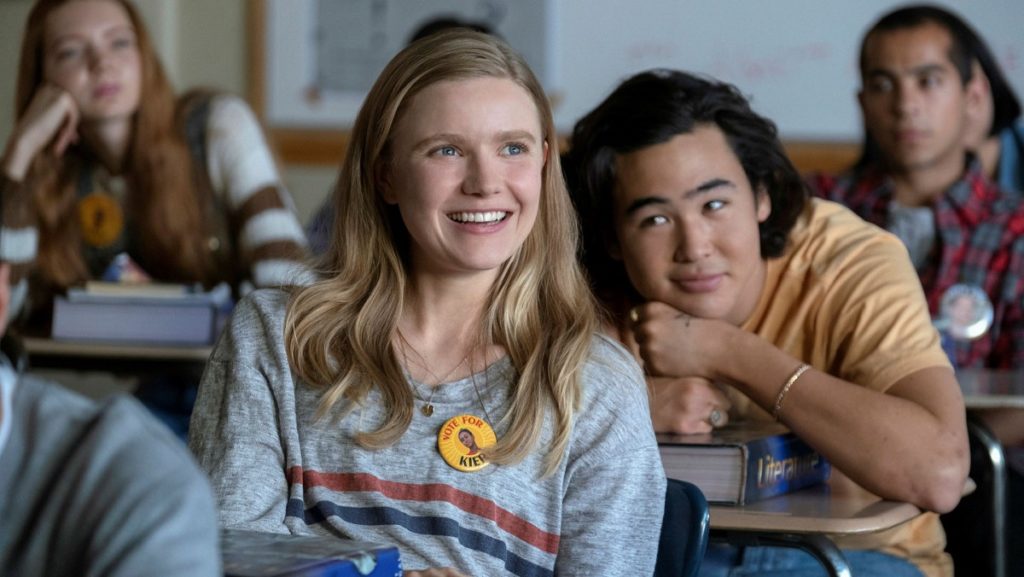“F— the Patriarchy” probably isn’t the best thing to say to your mom’s new boyfriend when sitting down to have dinner with the two of them. “Moxie,” directed by Amy Poehler, is a movie that represents the new era of feminism — white feminism, that is.
“Moxie” is based on a book of the same name that focuses on Vivian Carter (Hadley Robinson). Vivian tries to follow in the footsteps of her mom, Lisa Carter (Poehler), by protesting everything and starting a revolution against sexism at her high school. She does this by creating an anonymous zine called “Moxie” that addresses issues happening in the school, like sexist classmates and unfair dress code rules.
“Moxie” features a diverse group of actors that lends itself to a more intersectional storytelling approach. The cast features Korean-African-American actress Sydney Park, Chinese-American actress Lauren Tsai, Afro-Latina actress Alycia Pascual-Peña, trans actress Josie Totah, African-American actress Anjelika Washington and Emily Hopper, an actress with prosthetics who is wheelchair-bound in the film.
While “Moxie” appears diverse on screen, it is quite the opposite off. As much as the white writers and creators try to shine a light on the issues that the nonwhite characters are going through, there is a huge disconnect.
One of the most memorable moments of “Moxie” that touches on intersectionality is when Claudia (Tsai), Vivian’s best friend, opens up about what it’s like being the daughter of an immigrant. Claudia explains why she can’t protest in the way that Vivian does, bringing awareness to a problem that many women of color have gone through. Claudia explains to Vivan that because of her privilege, Vivian will never understand what Claudia’s parents have sacrificed for her to be where she is today. This is a great moment to have but is short-lived and barely acknowledged further.
Vivian has spent her life as a passive bystander. She starts her zine as a way to invoke change and give herself a voice against sexism, but when she sees harassment happening right in front of her, she does nothing. This is a common theme throughout the film; Vivian never steps out of her comfort zone and continuously second guesses herself. She so desperately needs to be validated in everything she does that if no one supported her crusade, she would have just remained an observer.
The only reason Vivian notices the sexism within her school was because new student Lucy Hernadez (Pascual-Peña) refuses to conform to the school’s outdated, discriminatory behavior. It takes someone else to show Vivian that what was going on around her wasn’t normal. Vivian even shames Claudia in true white savior fashion when she believes that Claudia isn’t doing “enough” to protest the unfair treatment of the women by their male classmates. Vivian quickly establishes herself as closed-minded, acting as if there is only one way to be a feminist — and that is by her own terms.
The plot of the film becomes messy and confusing when Vivian begins to spiral. Despite Vivian’s supposed attachment to making change, it is clear she doesn’t know how. The plot centers almost entirely around Vivian and whatever personal problems she has. The other characters were 10 times more interesting than Vivian but were given smaller scenes, fewer lines and half-baked character arcs. The amount of power this movie could have had if it starred anyone other than a white girl is outmatched.
Overall, “Moxie” is a great idea for a film. While thought and passion were clearly put into it, the execution was way off. Yes, screw the patriarchy, but also screw the racism, transphobia, ableism and sexual assault that the characters in this movie face. The end of the movie features a scene where a young Black girl stands up to declare that she is Black enough and that people shouldn’t touch her hair. An important statement, but it feels like it is checking off a box for inclusivity. Immediately after, the audience is thrown right back into Vivian and her love interest gazing at each other for the B-plot love story.
There are so many hardships exhibited throughout the film, but they play second fiddle to Vivian getting her first boyfriend. When serious issues are brought up that affect people other than Vivian, they are not at all prioritized. Both “Moxie” and its main character feel all too performative.





















